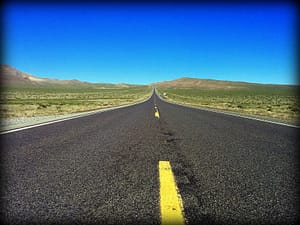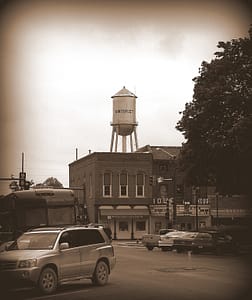Vanishing Point
by Brian
This story published in Soft Cartel
Greg was driving out West because he was out of ideas.
He passed through a long stretch of nothing but golden fields and the occasional billboard. Roads crisscrossed the fields, perfectly straight.
The plains appeared endless. Greg felt he was falling farther back, back into the plains. He was certain that if he turned down any one of the long, straight roads he would drive on forever
Greg’s great, great grandparents from Germany had been farmers in Kansas. The Old World must have been truly intolerable to them to make these abysmal plains a better prospect.
The Europeans who populated America hadn’t been looking for “freedom” or a “better life.” They were simply tired of the ways of their forebearers. America might be better than the Old World, or it might not. It might even be worse. But at least going there represented a break with tradition.
Greg felt like the mere outcome of historical forces. In driving West he sought to escape his past. Yet he was only going deeper into it.
There truly was nothing new under the sun. Out here in the plains one understood this, viscerally. One was naked before self, history, and god in the plains.
II.
“Best Hamburgers in Kansas,” read a billboard. “3 Miles Ahead.”
Beef would do him good. Beef and a cup of coffee.
The places people lived. Folks out here were grasses blowing in the wind, spreading their seeds to the air, laying down roots in the earth. Man, the invasive species.
There was something in the blood. Each family buzzed at its own frequency, humming to each other in a secret language.
Greg had a recurring dream of living in a shack in the plains. The shack was warm and cozy, all was provided, and he did not want to leave.
In the dream, a black car appeared at the cabin. Greg got in the backseat and off the car went, straight into the golden fields.
Greg thought the dream was about death. Then again, all dreams were about death.
III.
Greg the Kansan swung his car into the turnout for the burger stand. Behind the half-moon shaped parking lot was a golden wall. Occupying the back right was a 10 ft. x 10 ft. wooden shack. Smoke poured from the shack’s metal chimney.
Greg parked and walked toward the stand. Breeze rippled the top of the fields, moving in like an unseen animal across the expanse.
“Hello,” said Greg.
“Hello,” said a man behind the counter.
“I’ll have a cheeseburger, please,” said Greg.
“No can do,” said the man. “I make the best hamburgers in Kansas, not the best cheeseburgers. People assume that a cheeseburger is just a hamburger with cheese, but that’s not right. Cheeseburgers and hamburgers are completely different.”
Greg was too hungry to argue. “Make it a hamburger,” he said.
“One cheese-less cheeseburger coming right up,” said the man, turning to the grill.
Greg heard the plat of the meat hitting the grill and vigorous sizzling. The beef smelled delicious.
“What’re we drinking?” said the man.
“Coffee, if you’ve got it.”
“I just brewed a pot.”
It was good and strong. The man set the burger on the counter. Spicy-salty-oily-sweet beef, washed down with coffee, was manna from heaven.
“Did you grow up in Kansas,” said Greg. “You sound like you’re from back East.”
“I’m from all over. But I like it here. It’s quiet. And folks are decent—as decent as folks can be.”
“My great-great grandparents lived in Kansas.”
“What part?”
“I’m not sure. Last name is Heigler.”
“Well dip me in duck shit. That’s my last name.”
Greg did feel a connection with the man. There was something in the blood. Each family buzzed at its own frequency, humming to each other in a secret language.
“Where you headed?” Heigler asked Heigler.
“Colorado. How long until I reach the state line?”
“About three hours, if you press the issue.”
“I intend to.”
“What’s the rush?”
“A man just likes to make time.”
“If man could make time he’d be God, and not man.”
IV.
Greg started back on the highway. Within a few seconds he was completely surrounded by the plains and nothing but the plains, so help him god.
Five miles down the road the car lost power. Greg coasted to the side of the highway at a wide-shouldered section.
Greg opened the hood and inspected the engine. Nothing was obviously the matter. As he was checking the connections an old pickup truck pulled alongside him.
“Need a hand?” the driver said.
“Can I get a ride into town? She’s completely dead.”
The man nodded and said, “Get in.”
Where go you, America, in the sad dark night?
It was a ten minute ride to the town of Salina. The man did not say a word the entire ride. He listened to Christian talk radio in which a host repeatedly asked the audience, “Do you know Jesus?”
Greg did not know Jesus, but he suspected that the driver did. People in towns like Salina needed to know Jesus. In the big city, there was so much else to know.
The driver dropped Greg off in front of a mechanic’s shop on Main Street. He explained to the clerk that he needed his car picked up and brought in for repair. The car was between mile markers 216 and 217 on Highway 86, he said.
Since it would take at least a day for the car to be fixed, Greg got a motel room. That evening he had a meatloaf dinner at a country kitchen and retired to his room.
He didn’t feel much like watching television. Reading material consisted of the phone book and Gideon’s Bible.
Greg flipped through the listings until he reached the H last names. Heigler. 8 listings.
Greg listened to the cars driving past the motel on Main Street. He thought about how each car was its own story, and how stories followed specified lanes, like roads. Life forced us into paths that others had created. You never really went your own way.
Where go you, America, in the sad dark night? You hum so sweetly on the roads everyone has been down, speeding off towards the future, which is always past.
After his night in Salina Greg never again had the dream about the shack in the plains. The absence of the dream left a void that no memory could fill.

